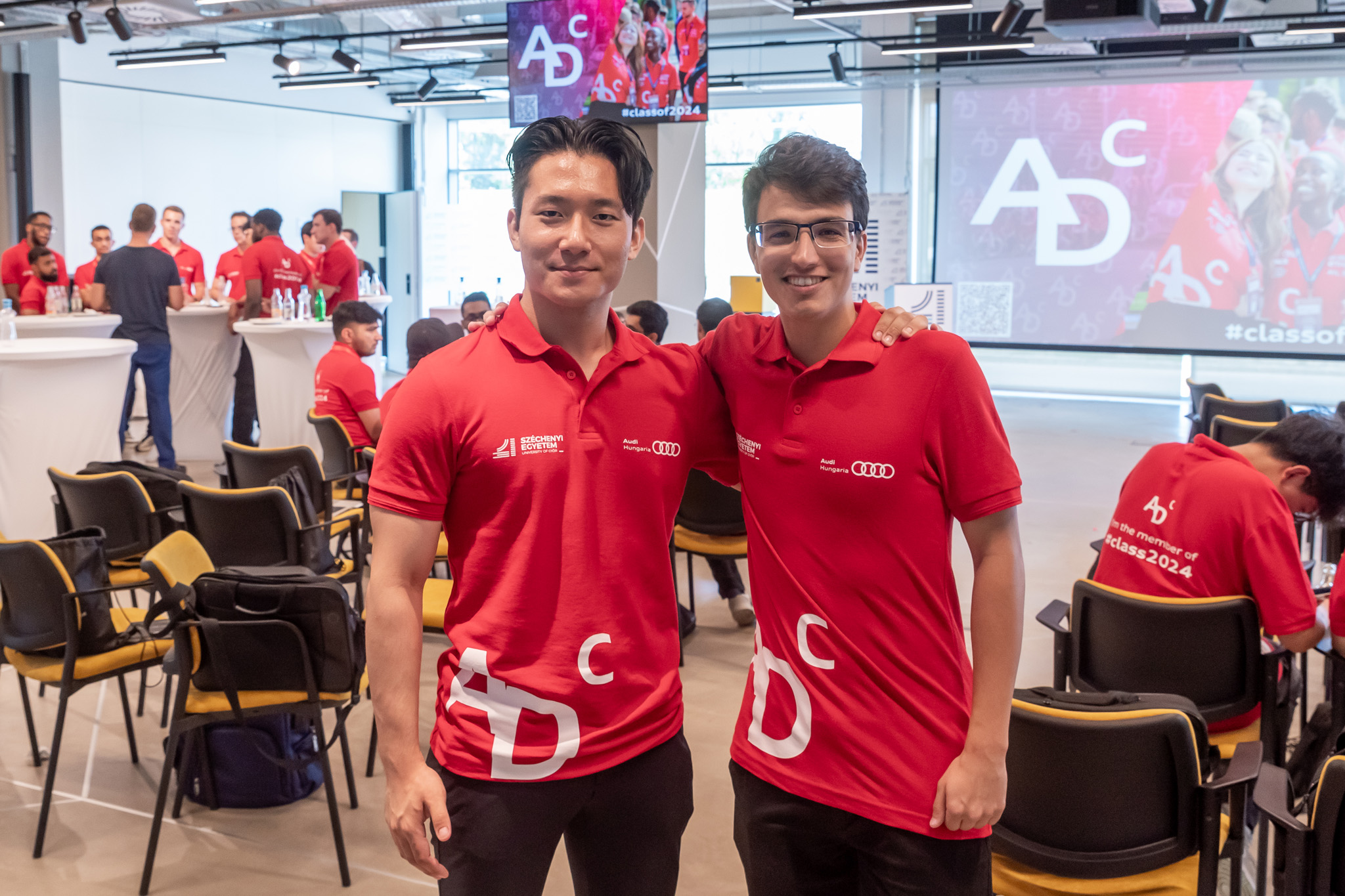Audi Development Camp Participants Design Electric Powertrain at SZE
The fourth edition of the Audi Development Camp, a short study programme organised by Széchenyi István University and Audi Hungaria, has come to an end. During the one-week programme, which provided micro-certificates, students from 20 countries worked on simulating the powertrain of an electric vehicle.
Out of nearly 130 applicants, 35 talented young individuals were selected to participate in the Audi Development Camp, a short study programme jointly organized by Széchenyi István University and Audi Hungaria in August. The students, who hail from 20 different countries and universities, are studying in the fields of engineering and economics. They were primarily attracted to the camp by the opportunity to gain real-world experience, attend valuable professional lectures, and pursue their interest in the automotive industry. In this fourth edition of the event, participants worked in five-member teams on a project to design the most efficient electric vehicle powertrain using simulation.
The Audi Development Camp is a key element of the multifaceted collaboration between Széchenyi University and Audi Hungaria, which has been ongoing since 1993. Thanks to this partnership, the camp participants were able to acquire knowledge closely related to vehicle development from experts coming from both academic and corporate environments. Dr. Jan Rohde-Brandenburger, one of the main organizers of the event, embodies this partnership in his daily work, Head of the Department of Propulsion Technology and powertrain development expert at Audi Hungaria, also welcomed the participants at the University.
At the closing event of the ADC, Dr Rhode-Brandenburger expressed his gratitude towards the organisers for their dedication and was proud of the quality of the project work. "The professional jury was also impressed by the performance of the teams, we saw solutions that we had not expected in such a short time. The quality of the presentations was also outstanding," the expert stressed, praising the students who successfully completed the programme. He added that the Audi Development Camp was a successful week for both the company and the University.

Dr. Jan Rohde-Brandenburger praised the performance of the participants Audi Development Camp 2024. (Photo: András Adorján)
This year, for the first time, the entries were also scored on ESG criteria, so students analysed environmental, social and governance factors from a sustainability perspective. The teams performed outstandingly in this area, which was confirmed by the professional feedback of Dr Mónika Besenyei, Assistant Professor at the Department of Applied Sustainability of Széchenyi University, one of the mentors of the programme, at the closing event. The mentor of the engineering fields, Dr Csaba Tóth-Nagy, Associate Professor of the Department of Propulsion Technology, also evaluated the participants’ performance, highlighting that the jury had a hard time choosing the winner after seeing many excellent presentations.
On behalf of the participants, Laura Sánchez Rego bid farewell to the programme, highlighting the quality of the education, the social experience and the value of the real industrial challenge-based assignment. "It's a unique opportunity to work in an international environment where bachelor’s, master's and doctoral students work together to solve a real industrial problem. We thank our mentors and lecturers for being direct, kind and supportive, while imparting invaluable professional knowledge," she said in his closing remarks.

Laura Sánchez Rego believes that the professional and friendly relationships they have made here will last a lifetime (Photo: András Adorján)
Jung Han Lee, a student at Princeton University in the US, also found the task exciting and really enjoyed the simulation exercise. "I'm heading back to university in a few days, but I don't regret spending this last week at the Audi Development Camp. The programme required more energy and work than I had expected, but it was great to be encouraged throughout the programme to make the most out of it. I have learned a lot and got more out of this programme than I had previously hoped for," he said. The young student of electrical and computer engineering added that the social experiences during leisure time, such as barbecuing and dragon boating, also made the camp unforgettable.

Jung Han Lee and Barnabás Novák both study in the United States of America (Photo: András Adorján)
Barnabás Novák is about to start his fourth year at California State University, where he is studying Computer Engineering. He found the project particularly fitting. "We had a great group, quickly found common ground, and often worked late into the night, solving problems. The well-prepared instructors with extensive professional experience even involved us in the lectures. I liked that we could work on real problems; I can imagine a development engineer dealing with similar tasks in their daily work," said the only Hungarian participant in the camp. He also highlighted the diversity of the programme: "We had young people from Spain, Germany, China, and Nigeria, among others, so the week was spent in a truly international atmosphere."
 |
 |
 |
 |
 |
Gallery (Photos by: András Adorján).











